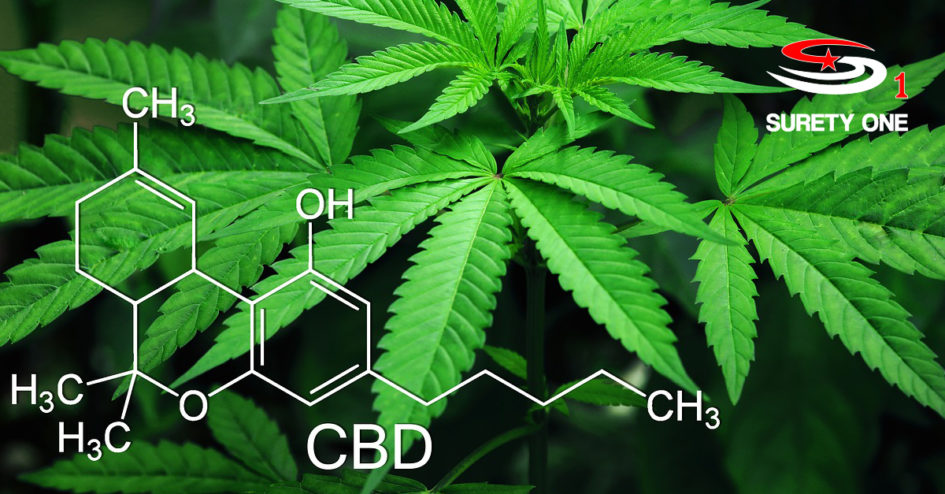The Hemp Farming Act of 2018, part of the larger Farm Bill effectively ended the prohibition on hemp cultivation, marketing and distribution. The Hemp Farming Act reverses a prohibition that has stood since the Marijuana Tax Act enacted in 1937, and opens a potentially lucrative new product line for farmers suffering from an ongoing fall in traditional crop prices. Hemp offers the benefit of extremely strong fibers making it an appropriate raw material for rope, fabrics and paper however by far the most popular use of hemp currently if for the manufacturing of cannabidiol. Supporters of CBD argue that it acts and an anti-inflammatory and mood-stabilizer without the intoxicating effects of marijuana with higher levels of THC. Sooner or later operators will face heavy regulation to include licensing, compliance with security and THC testing protocols and hemp producers surety bonds.
Per the Wall Street Journal, “. . . a research firm covering cannabis and hemp expects the CBD market in the U.S. to be valued at $20 billion by 2024, up from $1.9 billion in 2018. The U.S. Food and Drug Administration held a hearing in May on whether to allow the use of CBD in food. The FDA hasn’t said how long it would take to determine whether CBD is safe for consumption. The only FDA-approved use of CBD for now is in the anti-seizure drug Epidiolex. But use of CBD in consumer products such as oils and drinks is a legal gray area, and such products are already sold in many states.” Further, “New Leaf Data Service LLC, a price-reporting agency covering the cannabis and hemp markets, estimates that farmers planted more than 265,764 acres of hemp in 2019, over 10 times as much as two years ago.” (WSJ, “Business: Kirk Maltais, Oct. 9, 2019)
All indications are that hemp cultivation is here to stay which begs the question about regulation. Many state have or are in the process of creating a legislative framework for licensing and supervision hemp operators. Hemp is a farm product and is considered a commodity. Farm products are generally traded commodity handlers or commodity dealers. These intermediaries are licensed in many states so it would be logical for hemp regulations to mirror those of other crops, and in fact they do. Colorado is an excellent example of the use of an existing statutory framework and bringing hemp under that same scheme. A commodity dealer or handler in Colorado must be licensed and file a commodity dealer surety bond, among other licensing requirements. If other states follow suit then hemp operators should prepare to offer financial assurance in the form of surety bonds.
A “surety bond” is a financial instrument that guarantees that a principal, in this case a hemp operator will perform will comply with the laws that regulate his or her occupational license. Surety is not insurance but rather a third party financial guarantee of th principal’s promises. A surety company “wraps” the promise of the bonded principal with the good name and creditworthiness of the surety company. To date, surety bond penalties (bond amounts) have been relatively low however there are legislative efforts in several states that include surety bond provisions of $100,000 or more. Higher penalties will make it increasingly difficult for hemp producers and intermediaries to “get through the door”. Operators that intend to operate in the hemp space should begin to prepare to purchase hemp producers surety bonds. How? Let’s explore that.
A principal (bond applicant) retains the risk of any loss due to his or her failure to comply with the terms of his or her surety bond agreement. An underwriting review is generally required to “qualify” an applicant for the bond capacity that he or she seeks. Within the industry we refer to that review as “a look at the Three Cs”, meaning a subjective judgment about an applicant’s character, capacity and capital. An applicant for a hemp producer’s surety bond or commodity dealer bond can improve his or her chances of obtaining one at a reasonable price by providing the surety company a clear picture of these three Cs. Keeping one’s promises, especially with regards to financial obligations, evidencing experience in the farm sector and offering a robust financial statement are important underwriting factors and are completely within the principal’s control. As the industry evolves, hemp producer bonds and surety bonds for dealers/handlers will be required. Hemp sector participants should prepare for this likelihood.
National surety bond leader, Surety One, Inc. offers both surety and fidelity bonds needed by hemp operators in every state where they are required. Questions about hemp producers surety bonds? Call us at (800) 373-2804 or email us at Underwriting@SuretyOne.com.

